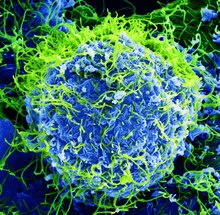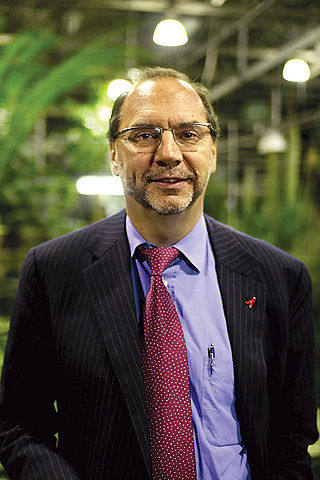
Sir Peter Karel, Baron Piot, is a Belgian-British microbiologist known for his research into Ebola and AIDS.

Mayinga N'Seka was a nurse in Zaïre, now Democratic Republic of the Congo. She died from Ebola virus disease during the 1976 epidemic in Zaïre. She has been incorrectly identified as the index case by several sources, but a World Health Organization commission report on the outbreak lists a man from Yambuku, Mabalo Lokela, as the index case. Lokela, a 44-year-old who had been buying meat in Sudan, died on September 8, 1976, over a month before N'Seka.

Health problems have been a long-standing issue limiting development in the Democratic Republic of the Congo.

Ebola, also known as Ebola virus disease (EVD) and Ebola hemorrhagic fever (EHF), is a viral hemorrhagic fever in humans and other primates, caused by ebolaviruses. Symptoms typically start anywhere between two days and three weeks after infection. The first symptoms are usually fever, sore throat, muscle pain, and headaches. These are usually followed by vomiting, diarrhoea, rash and decreased liver and kidney function, at which point some people begin to bleed both internally and externally. It kills between 25% and 90% of those infected – about 50% on average. Death is often due to shock from fluid loss, and typically occurs between six and 16 days after the first symptoms appear. Early treatment of symptoms increases the survival rate considerably compared to late start. An Ebola vaccine was approved by the US FDA in December 2019.

Recombinant vesicular stomatitis virus–Zaire Ebola virus (rVSV-ZEBOV), also known as Ebola Zaire vaccine live and sold under the brand name Ervebo, is an Ebola vaccine for adults that prevents Ebola caused by the Zaire ebolavirus. When used in ring vaccination, rVSV-ZEBOV has shown a high level of protection. Around half the people given the vaccine have mild to moderate adverse effects that include headache, fatigue, and muscle pain.

In 2014, an outbreak of Ebola virus disease in the Democratic Republic of the Congo (DRC) occurred. Genome sequencing has shown that this outbreak was not related to the 2014–15 West Africa Ebola virus epidemic, but was of the same EBOV species. It began in August 2014 and was declared over in November of that year, after 42 days without any new cases. This is the 7th outbreak there, three of which occurred during the period of Zaire.
Oyewale Tomori is a Nigerian professor of virology, educational administrator, and former vice chancellor of Redeemer's University. In 2024, he became the chair of West Africa National Academy of Scientists.
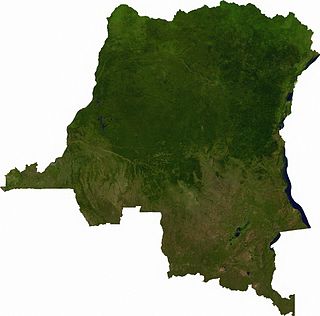
The Democratic Republic of the Congo (DRC) was identified by the World Health Organization (WHO) on 11 May 2017 as having one Ebola-related death.

The 2018 Équateur province Ebola outbreak occurred in the north-west of the Democratic Republic of the Congo (DRC) from May to July 2018. It was contained entirely within Équateur province, and was the first time that vaccination with the rVSV-ZEBOV Ebola vaccine had been attempted in the early stages of an Ebola outbreak, with a total of 3,481 people vaccinated. It was the ninth recorded Ebola outbreak in the DRC.

Oly Ilunga Kalenga is a Belgian–Congolese medical doctor who was the Democratic Republic of the Congo's Minister of Public Health from 2016 to 2019. He resigned his post on 22 July 2019, then was arrested on 14 September 2019 for allegedly mismanaging a portion of Congo's $4.3 million in Ebola response money, an allegation that he denies.
Likati is a town in the Aketi Territory of Bas-Uélé Province in the north of the Democratic Republic of the Congo (DRC).
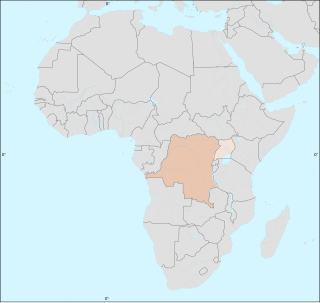
The Kivu Ebola epidemic was an outbreak of Ebola virus disease (EVD) mainly in eastern Democratic Republic of the Congo (DRC), and in other parts of Central Africa, from 2018 to 2020. Between 1 August 2018 and 25 June 2020 it resulted in 3,470 reported cases. The Kivu outbreak also affected Ituri Province, whose first case was confirmed on 13 August 2018. In November 2018, the outbreak became the biggest Ebola outbreak in the DRC's history, and had become the second-largest Ebola outbreak in recorded history worldwide, behind only the 2013–2016 Western Africa epidemic. In June 2019, the virus reached Uganda, having infected a 5-year-old Congolese boy who entered Uganda with his family, but was contained.
Ansuvimab, sold under the brand name Ebanga, is a monoclonal antibody medication for the treatment of Zaire ebolavirus (Ebolavirus) infection.

The Institut National de la Recherche Biomédicale (INRB) is the national medical research organization of the Democratic Republic of the Congo. The responsible ministry is the Ministry of Scientific Research and Technology.

In August–November 1976, an outbreak of Ebola virus disease occurred in Zaire. The first recorded case was from Yambuku, a small village in Mongala District, 1,098 kilometres (682 mi) northeast of the capital city of Kinshasa.
Atoltivimab/maftivimab/odesivimab, sold under the brand name Inmazeb, is a fixed-dose combination of three monoclonal antibodies for the treatment of Zaire ebolavirus. It contains atoltivimab, maftivimab, and odesivimab-ebgn and was developed by Regeneron Pharmaceuticals.
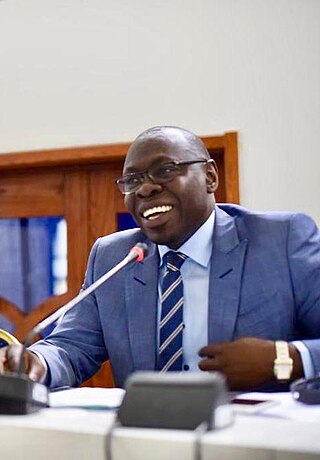
Ibrahima Socé Fall is a Senegalese executive in the area of global health. He is Assistant Director-General for Emergencies Response at the World Health Organization (WHO) and United Nations Assistant – Secretary-General. Fall has worked on various outbreak response and research teams in the field to eradicate the spread of diseases including COVID-19, Ebola, malaria, AIDS, and tuberculosis. He was previously the Regional Emergencies Director of the WHO in the African Region and worked on Health Security and emergency preparedness and specially on emerging and re-emerging infectious diseases, epidemics and humanitarian crises.
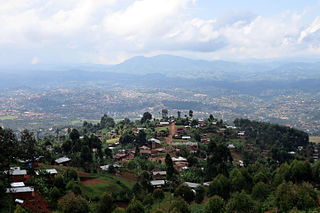
On 7 February 2021, the Congolese health ministry announced that a new case of Ebola near Butembo, North Kivu had been detected the previous day. The case was a 42-year-old woman who had symptoms of Ebola in Biena on 1 February 2021. A few days after, she died in a hospital in Butembo. The WHO said that more than 70 people who had contact with the woman had been tracked.
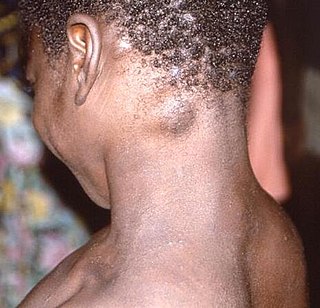
Mpox is endemic in western and central Africa, with the majority of cases occurring in the Democratic Republic of the Congo (DRC), where the disease is reportable. There, the more virulent Congo basin virus type has been affecting some of the world's poorest and socially excluded communities.

